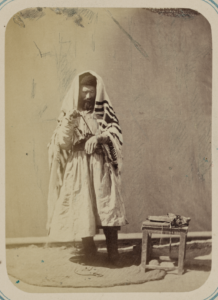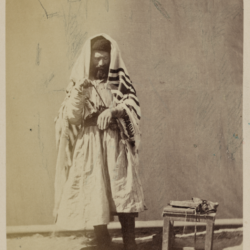In Jewish liturgy, some passages are dəvarim she-bi-qdushah, passages that require public communal prayer. Most famous among these are the Qaddish, Barkhu, and Qədushah. But people are not always able to pray in a community! In liturgical history both ancient and modern many different tashlumim (replacements) for these texts when praying individually have been suggested. The following is the Qədushah d-Yotser Or for an individual from Seder Rav ȝAmram, the oldest known full siddur. Much of the content is from the hekhalot literature or the Gemara, often demonstrating girsaot not otherwise known.
Note: “The CAUSE” is used to translate the Divine Name YHVH, based on the philosophical idea of God as the Prime Mover and on the interpretation of the Name as a causative form of the copula – “causes to be.” This translation also uses the plural pronouns They/Their/Them to refer to God as a pluralis majestatis, and to avoid the implications of God being assigned a gender. (Find Ibn Ezra’s commentary on Genesis 1:1 for a discussion of the pluralis majestatis when referring to God.) All divine referents (pronouns, epithets, names) are rendered in unicase.
| Source (Hebrew) | Translation (English) |
|---|---|
כיון שיגיע ”בנחת רוח“ אומר |
When one gets to “with proud spirit,”[1] From the Yotser Or blessing. In common practice this passage is no longer considered dəvarim she-biqdushah, although some Sefaradim still refrain from saying it when praying individually. say: |
נַהֲרֵי שִׂמְחָה נַהֲרֵי שָׂשׂוֹן נַהֲרֵי גִּלָּה נַהֲרֵי רָצוֹן נַהֲרֵי אַהֲבָה נַהֲרֵי רֵעוּת מִשְׁתַּפְּכִין וְיוֹצְאִין מִלִּפְנֵי כִּסֵּא הַכָּבוֹד וּמִתְגַּבְּרִין וְהוֹלְכִין בְּשַׁעֲרֵי נְתִיבוֹת עֲרָבוֹת רָקִֽיעַ מִקּוֹל נִגּוּן כִּנּוֹרוֹת חַיּוֹתָיו וּמְקוֹל רִנַּת תֻּפֵּי אוֹפָנִּים וּמְקוֹל זְמִירוֹת צִלְצְלֵי כְּרוּבִּין מִתְגַּבֵּר וְיוֹצֵא הַקּוֹל בְּקוֹל רַֽעַשׁ גָּדוֹל בִּקְדֻשָּׁה בְּשָׁעָה שֶׁיִּשְׂרָאֵל אוֹמְרִין לְפָנָיו קָד֧וֹשׁ ׀ קָד֛וֹשׁ קָד֖וֹשׁ יְהֹוָ֣ה צְבָא֑וֹת מְלֹ֥א כׇל־הָאָ֖רֶץ כְּבוֹדֽוֹ׃ (ישעיה ו:ג) |
Rivers of happiness, Rivers of joy, Rivers of merriment, Rivers of desire, Rivers of love, Rivers of friendship …cascade and go out from before the Throne of Glory and grow stronger and go in the gates of the paths of ȝAravoth, the [seventh] firmament, from the sound of Their beast-angels’ lyre music, and from the sound of the wheel-angels’ drum cheer, and from the sound of the mount-angels’ cymbal hymns, the sound grows stronger and goes out in a loud rushing sound in holiness at the time that Israel says before Them: “Holy, holy, holy is the Cause of Multitudes! All the earth is full of Their glory!” (Isaiah 6:3) [2] From Hekhalot Rabbati 10:3 |
אָמַר רַבִּי יִשְׁמָעֵאל שָׁלֹשׁ כִּתּוֹת שֶׁלְּמַלְאֲכֵי הַשָּׁרֵת אוֹמְרוֹת קָדוֹשׁ בְּכׇל־יוֹם כַּת אַחַת אוֹמֶֽרֶת קָדוֹשׁ וְכַת אַחֶֽרֶת אוֹמֶֽרֶת קָדוֹשׁ קָדוֹשׁ וְכַת אַחַת אוֹמֶֽרֶת קָד֧וֹשׁ ׀ קָד֛וֹשׁ קָד֖וֹשׁ יְהֹוָ֣ה צְבָא֑וֹת מְלֹ֥א כׇל־הָאָ֖רֶץ כְּבוֹדֽוֹ׃ (ישעיה ו:ג) |
Said Rabbi Yishmaȝel: Three parties of ministering messenger-angels say “Holy!” every day. One party says “Holy!” Another party says “Holy, holy!” And one party says: “Holy, holy, holy is the Cause of Multitudes! All the earth is full of Their glory!” (Isaiah 6:3) [3] Possibly a variant form of Ḥullin 91b. |
וממשיכים ”בוהאופנים וחיות הקודש“… |
And continue with “And the wheel-angels and holy beasts…” |
Notes

“תשלום לקדושה דיוצר אור ליחיד (סדר רב עמרם) | Replacement for the Qədushah d-Yotser Or for an individual praying alone or without a minyan, from Seder Rav ȝAmram” is shared through the Open Siddur Project with a Creative Commons Attribution-ShareAlike 4.0 International copyleft license.




Leave a Reply